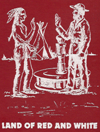 BACK IN THOUGHT WITH W. B. CAMERON
BACK IN THOUGHT WITH W. B. CAMERON
An excerpt from "Life in the Old West", printed in the 1961 edition of the Farm and Ranch Review; contributed to us by Mrs. Lucille Clack. This little farm magazine, published in Calgary, Alberta was almost a tradition in the homes of the settlers of this area for many years. Publication of the Farm and Ranch Review was discontinued in the early 1960's.
On a sunny June afternoon in 1925 William Bleasdell Cameron unveiled a memorial at the scene of the bloody 1885 Frog Lake Massacre. The monument was erected by the Canadian Government Board of Historic Sites and Monuments as a tribute to the courageous pioneers who died there. Only by the greatest whim of fate was Mr. Cameron performing this office for which he had been chosen. He was the lone white male survivor of that early Frog Lake settlement. Some of Mr. Cameron's thoughts as he waited on that spot forty years later, while official speakers addressed the crowd of Indian, White and Metis people, now gathered in peace for the occasion, are taken from his book, "Blood Red the Sun."
While Judge Howay, who represented the Government, spoke I stood before the cairn and looked about me. Close beside it were eight graves marked by simple iron crosses bearing names familiar to me since youth; Quinn, Delaney, Gowanlock, Gilchrist, Dill, Williscroft, Cowan - the names of men, nearly all of whose hands, long cold and still, had once met mine in the warm clasp of friendship. Memories brought back vividly the faces of those pioneers, once so full of life, of plans, of ambitions. And I reflected that, for forty years they had rested there; that the snows of forty winters and showers of forty summers had fallen, like a benediction, upon them as they slept their dreamless and unbroken sleep.
Across the short intervening span of wooded hill and gentle, grassy slope I saw the spot that marked for these adventurous souls the end of the trail. I heard again all the frightful sounds â exploding guns, the startled shrieks, the outcries, the galloping horses and the strangely terrifying cadence of the Mauchawahhawknigamawn â the war song, and the appalling whoops of the frenzied savages; the ineffectual "Stop! Stop!" of Chief Big Bear as he rushed toward the carnage; the sputtered admonition of shaking old Chief Osowask; Old Yellow Bear, willing, yet fearful, too openly, in that hour of dreadful deeds, to befriend me; "go with the women - don't leave them!" And I remembered, too, the hopelessness that possessed me, the impossibility at the moment that I should by any miracle escape the doom that with such stupifying and ghastly suddenness was sweeping over the others. Yes, for forty years these gallant fellows had rested quietly there, while I walked and wrought and played in God's glorious sunlight and had known all the joy of living, and now had sons grown to the age that I was then.
An Indian, a pure blood Cree, mounting a knoll, read in rounded English periods, from a manuscript in his hand, an eloquent address. It was not an apology - it was not meant to be - for the massacre. It was a plea for charity, for consideration, for understanding of the Red Man and of the feeling which culminated in the commission of that dark and bloody crime. He cast what must have been, to most of the listening Whitemen, a new light on that ruthless and deadly act of vengeance. The land of the Indian, a proud people, was being wrested from his grasp by pale-skinned strangers who looked with scarcely disguised contempt upon him as an inferior, and derided his pretentions of ownership.
Well! The Indian was not to be trampled upon - he would show them! He would destroy the invader, he would take back his country! Poor simple children of nature! The provocation, while it did not excuse, was some mitigation of the wrong. Let the Whiteman put himself in the Indian's place! Even so, the majority of the Indians were against .it; Big Bear's men only, and a few others were implicated. The Cree Indian speaker was the Reverend Edward Ahenakew, an ordained clergyman of the Church of England.
I drew the cord; the flag fluttered down. The cairn, its bronze inscription glowing in the warm sunlight, stood uncovered. The Government of the country had paid its tribute to these stalwart pioneers of '85. "It was a solemn moment."


